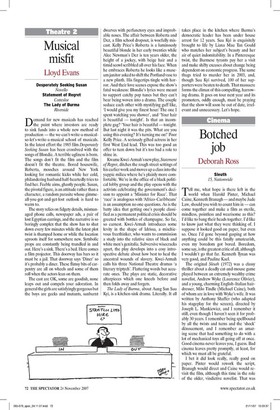Musical misfit
Lloyd Evans Desperately Seeking Susan Novello Statement of Regret Cottesloe The Lady of Burma Riverside Demand for new musicals has reached the point where investors are ready to sink funds into a whole new method of production — the we-can't-write-a-musicalso-let's-write-a-musical school of musicals. In the latest effort the 1985 film Desperately Seeking Susan has been crossbred with the songs of Blondie. A terrible ugliness is born. The songs don't fit the film and the film doesn't fit the theatre. Bored housewife, Roberta, mooches around New York looking for romantic kicks while her cold, philandering husband half-heartedly tries to find her. Feeble aims, ghastly people. Susan, the pivotal figure, is an attitude rather than a character, a random parasite whose gimmeall-you-got-and-get-lost outlook is hard to warm to.
The story relies on fidgety details, mismanaged phone calls, newspaper ads, a pair of lost Egyptian earrings, and the narrative is so boringly complex that the show has to shut down every few minutes while the latest plot twist is thumped home or while the location uproots itself for somewhere new. Symbolic props are constantly being trundled in and out. Here's a sink. There's a bed. Here comes a film projector. This doorway has bars so it must be a jail. That doorway says 'Diner' so it's probably a diner. These flimsy bits of carpentry are all on wheels and some of them roll when the actors lean on them.
The cast are OK, some are goodish, none leaps out and compels your adoration. In general the girls are satisfyingly gorgeous but the boys are geeks and mutants, sunburnt dwarves with perfunctory eyes and improbable noses. The affair between Roberta and Dez, a film school dropout, is woefully miscast. Kelly Price's Roberta is a luminously beautiful blonde in her early twenties while Alec Newman's Dez is ten years older, the height of a jockey, with beige hair and a timid scowl scribbled all over his face. When he embraces Roberta he looks like a museum janitor asked to shift the Portland vase to a new plinth. His fingertips tingle with horror. And their love scenes expose the show's fatal weakness: Blondie's lyrics were meant to support catchy pop tunes but they can't bear being woven into a drama. The couple seduce each other with mystifying guff like, 'I would give you my finest hour/ The one I spent watching you shower', and 'Your hair is beautiful — tonight'. Is that an incomplete gag? 'Your hair is beautiful — tonight But last night it was the pits. What are you using this evening? It's turning me on!' Poor Kelly Price. A seriously gifted actress in her first West End lead. This was too good an offer to turn down but it's too bad a role to shine in.
Kwame Kwei-Armah's new play, Statement of Regret, ditches the rough street settings of his earlier work and moves up a class into the yuppie milieu where he's plainly more comfortable. We're in the office of a black political lobby group and the play opens with the activists celebrating the government's decision to appoint a 'Minister for Race'. That 'race' is analogous with Africo–Caribbeans' is an assumption no one questions. As is the batty idea that getting one's people classified as a permanent political crisis should be greeted with bottles of champagne. So far, so earnest. Kwei-Armah introduces some levity in the shape of Idrissa, a mischievous freethinker, who wants to commission a study into the relative sizes of black and white men's genitalia. Subversive wisecracks apart, the play develops into a cosy introspective debate about how best to heal the ancestral wounds of slavery. Kwei-Armah calls his three National Theatre dramas 'a literary triptych'. Flattering words but accurate ones. The plays are static, decorative altarpieces which one kneels before and then folds away and forgets.
The Lady of Burma, about Aung San Suu Kyi, is a kitchen-sink drama. Literally. It all takes place in the kitchen where Burma's democratic leader has been under house arrest for 12 years. Suu Kyi is exquisitely brought to life by Liana Mau Tan Gould who matches her subject's beauty and her air of quiet indomitability. In a Pinteresque twist, the Burmese tyrants pay her a visit and make shifty excuses about change being dependent on economic progress. The same thugs tried to murder her in 2003, and, though Suu Kyi survived, 100 of her supporters were beaten to death. That massacre forms the climax of this compelling, harrowing drama. It goes on tour next year and its promoters, oddly enough, must be praying that the show will soon be out of date, irrelevant and unnecessary. Let's hope.






































































 Previous page
Previous page